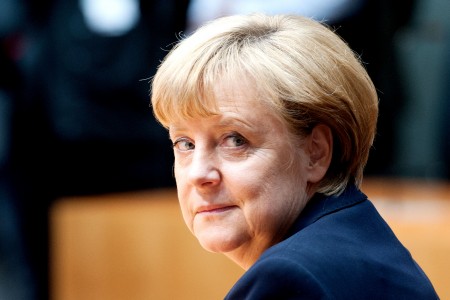
From Philipp Wittrock, Spiegel: While the Chancellery appears to be outraged by the NSA’s spying tactics in Germany, the opposition doubts the revelations came as a surprise to Angela Merkel. Just how much could she have known? . . .
The opposition doesn’t believe that Merkel was unaware of the situation. In an editorial for the Frankfurter Allgemeine Zeitung this week, Sigmar Gabriel, chairman of the center-left Social Democratic Party (SPD), openly aired the suspicion that Merkel was familiar with at least some of the spying activity. The government has vehemently rejected this accusation as crude campaign bluster. This isn’t totally unjust — the opposition has seized on the opportunity to portray Merkel as a traitor to citizens’ freedoms, a strategy that could gain support among a population particularly sensitive to data protection issues. . . .
The election campaign aside, there are good reasons to ask critical questions of not just the Americans, but the German government too. Intelligence expert Erich Schmidt-Eenboom says that Gabriel’s suspicion is "at least tendentially" correct. "According to my estimation, the authorities knew about this," he told broadcaster Deutschlandfunk.
That’s because the Federal Office for Information Security (BSI), which is responsible for protecting government networks, compiles threat analyses for the Interior Ministry. And adversaries include "not only China or Russia, but also the Anglo-Saxon services," Schmidt-Eenboom said. Additionally, Germany’s foreign intelligence agency (BND) is familiar with the capacities of allied intelligence agencies, he added. In turn, the BND briefs the Chancellery, or more precisely its chief of staff, Ronald Pofalla, who is responsible for coordinating the intelligence agencies. He then shares this information with the chancellor when he sees fit.
On Wednesday, Pofalla is to sit before the Parliamentary Control Committee of the Bundestag for a question and answer session. The heads of the three German intelligence agencies — responsible for foreign, domestic and military intelligence — were also invited to the special session. The questions there will probably follow the same line of logic: How much did the German agencies know about the activities of their American counterparts? How much would they like to know? And could it be that German counterintelligence is not functioning? The SPD, however, cannot hide behind Merkel’s conservatives. After all, it was current opposition leader Frank-Walter Steinmeier who occupied Pofalla’s post from 1999 to 2005, in the delicate time after the attacks of Sept. 11, 2001, when US intelligence agencies were certainly not idle.
One thing is obvious: No one believed that the NSA was steering clear of Germany. When it comes to the war on terror, Germany has frequently benefited from the work of American spies. The information that led to the 2007 capture of the so-called "Sauerland cell" came from the NSA and CIA, which had intercepted phone calls and emails. Even if the partner services don’t normally get to see the raw data, the Germans should have been able to figure out that the Americans could only collect this information through very comprehensive surveillance.
From Yassin Musharbash and Marcel Rosenbach, Guardian: When Fritz Gelowicz, Daniel Schneider and Adem Yilmaz enter the courtroom on Wednesday next week, it will be the first time that they will have seen each other since that fateful Tuesday in September 2007, when the three young men from the German towns of Ulm, Neunkirchen and Langen became known overnight as the "Sauerland group," an alleged terror cell that investigators say was planning a horrific act: simultaneous car bomb attacks with as many victims as possible. "The world will burn," as one of the defendants reportedly said.
Ever since a massive police detachment of 600 officers surprised the trio in Oberschledorn in the state of North Rhine-Westphalia, catching them in the act of mixing the ingredients for their alleged test bombs, the Islamists have been held at widely separated locations.
From Michael Steininger, Christian Science Monitor: “The reaction of the chancellor suggests she might have known about the spying,” wrote Sigmar Gabriel, chairman of the main opposition party, the center-left Social Democrats (SPD), in a commentary in Frankfurter Allgemeine Zeitung. . . .
“Either Merkel knew a lot more than she was letting on – or she knew nothing. Both cases would be a scandal,” says Thomas Oppermann, chief whip for the SPD in the German parliament, the Bundestag. Mr. Oppermann has called a meeting of the Bundestag Oversight Committee for Wednesday to look into Merkel’s handling of the affair and into why the German secret service, the BND, either did not detect the spying or knew about it and did not report it.
From Kate Connolly, Guardian: "If these reports are confirmed in the course of our investigations, we will be looking at an extremely serious incident," she [German Chancellor Angela Merkel] said. "Using bugs to listen in on friends in our embassies and EU representations is not on. The cold war is over. There is no doubt whatsoever that the fight against terrorism is essential, and it needs to harness intelligence about what happens online, but nor is there any doubt that things have to be kept proportionate. That is what guides Germany in talks with our partners. . . ."
Merkel acknowledged that foreign intelligence agents had helped thwart terrorist attacks on German soil. "Like most Germans, I am well aware that other countries’ services have helped identify terrorist groups in Germany and prevent their attacks on a number of occasions. That said, the need to protect privacy also has to be respected alongside security interests. There has to be balance between the two."
She said Germany’s domestic intelligence agency, the BND, was working closely with its European counterparts to throw light on what was alleged to have taken place. "Our services and our ministries are working at all levels – at the European level too – to clear up what has happened, including the new issues that came to light at the weekend," she said. (photo: Nove Inicijative)
Image: nove%207%203%2013%20Merkel.jpg
